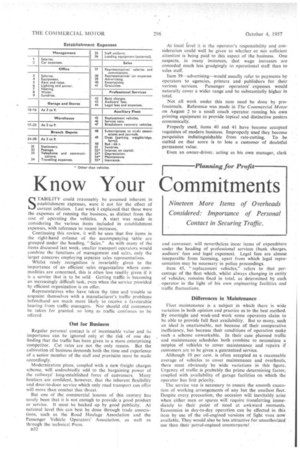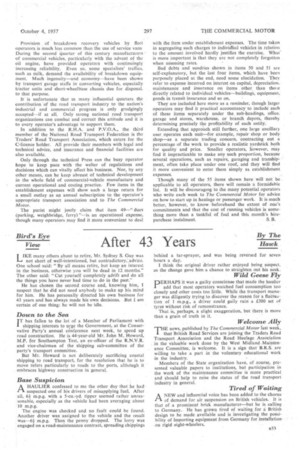Know Your Commitments
Page 74

Page 79

If you've noticed an error in this article please click here to report it so we can fix it.
Nineteen More Items of Overheads Considered: Importance of Personal Contact in Securing Traffic.
STABILITY could reasonably be assumed inherent in establishment expenses, were it not for the effect of current inflation. Last week I explained that these were the expenses of running the business, as distinct from the cost of operating the vehicles. A start was made in considering the various items included in establishinent expenses, with reference to recent increases.
Continuing this review, it will be seen that five items in the right-band column of the accompanying table are grouped under the heading, " Sales." As with many of the items discussed last week, smaller transport operators would combine the functions of management and sales, only the larger concerns employing separate sales representatives.
Whilst ready recognition is invariably given to the importance of an• efficient sales organization where commodities are concerned, this is often less readily given if it is a service that is to be sold. Getting traffic is becoming . an increasingly difficult task, even when the service provided by efficient organization is on offer.
Representatives who have taken the time and trouble to acquaint themselves with a manufacturers traffic problems beforehand are much more likely to receive a favourable hearing from traffic managers. Nor should old customers be taken for granted, so long as traffic continues to be offered.
Out for Business
Regular personal contact is of inestimable value and its importance can be ignored only at the risk of one day finding that the traffic has been given to a more enterprising competitor. Cut rates are not the only reason. But the cultivation of business demands both the time and experience of a senior member of the staff and provision must be made accordingly.
Modernization plans, coupled with a new freight charges scheme, will undoubtedly add to the bargaining power of the railways' long-established force of canvassers. Many hauliers are confident, however, that the inherent flexibility and door-to-door service which only road transport can offer will more than combat that threat.
But one of the commercial lessons of this century has surely been that it is not enough to provide a good product or service. It must be backed up by good publicity. At national level this can best be done through trade associations, such as the Road Haulage Association and the Passenger Vehicle Operators' Association, as well as through the technical Press.
D32
At local level it is the operator's responsibility and consideration could well be given to whether or not sufficient attention is being paid to this aspect of the business. One suspects, in many instances, that wage increases are conceded much less.grudgingly to operational staff than to sales staff.
Item 39—advertising—would usually refer to payments by operators to agencies, printers and publishers for their various services. Passenger operators' expenses would naturally cover a wider range and be substantially higher in total.
Not all work under this item need be done by professionals. Reference was made in The Commercial Motor on August 2 to a small coach operator running his own printing equipment to provide topical and distinctive posters economically.
Properly used, items 40 and 41 have become accepted requisites of modern business. Improperly used they become perquisites indistinguishable from rate-cutting. To be outbid on that score is to lose a customer of doubtful permanent value.
Even an owner-driver, acting as his own manager, clerk and canvasser, will nevertheless incur items of expenditure under the heading of professional services (hank charges, auditors' fees and legal expenses). Legal fees are almost inseparable from licensing, apart from which legal representation may be necessary in police proceedings.
Item 45, "replacement vehicles," refers to that percentage of the fleet which, whilst always changing in entity of vehicles, remains fixed in total, as determined by each operator in the light of his own engineering facilities and traffic fluctuations.
Differences in Maintenance Fleet maintenance is a subject in which there is wide variation in both opinion and practice as to the best method. By overnight and week-end work some operators claim to be able to provide full fleet availability. But to many, such an ideal is unattainable, not because of their comparative inefficiency, but because their conditions of operation make such a scheme unworkable. In their case planned traffic and maintenance schedules both combine to necessitate a surplus of vehicles to cover maintenance and repairs if customers are to be given a guaranteed service.
Although 10 per cent, is often accepted as a reasonable average of vehicles to cover maintenance and overhauls, there must obviously be wide variations in this figure. Urgency of traffic is probably the prime determining factor, coupled with availability of garage facilities on which the operator has first priority.
The service van is necessary to ensure the smooth execution of working arrangements of any but the smallest fleet. Despite every precaution, the occasion will inevitably arise when either men or spares will require transferring immediately to their point of need at awkward moments. Economies in day-to-day operation can be effected in this item by use of the oil-engined versions of light vans now available. They would also be less attractive for unauthorized use than their petrol-engined counterparts! Provision of breakdown recovery vehicles by fleet operators is much less common than the use of service vans During the second quarter of this century manufacturers of commercial vehicles, particularly with the advent of the oil engine, have provided operators with continuingly increasing reliability. Even so, some specialists' traffics, such as milk, demand the availability of breakdown equipment. Much ingenuity—and economy—have been shown by transport garage staffs in converting vehicles, especially tractor units and short-wheelbase chassis due for disposal. to that purpose.
It is unfortunate that in many influential quarters the contribution of the road transport industry to the nation's industrial and commercial progress is only grudgingly accepted—if at all. Only strong national road transport organizations can combat and correct this attitude and it is to every operator's advantage to support them.
In addition to the R.H.A. and P.V.O.A., the third member of the National Road Transport Federation is the Traders' Road Transport Association, which caters for the C-licence holder. All provide their members with legal and technical advice, and insurance and financial facilities are also available.
Only through the technical Press can the busy operator hope to keep pace with the welter of regulations and decisions which can vitally affect his business. Nor, by any other means, can he keep abreast of technical development in the whole field of commercial-vehicle manufacture and current operational and costing practice. Few items in the establishment expenses will show such a large return for a small outlay as an annual subscription to the operator's appropriate transport association and to The Commercial Motor.
The purist might justly claim that item 49—" dues (parking, weighbridge, ferry) "—is an operational expense, though many operators may find it more convenient to deal
with the item under establishment expenses. The time taken in segregating such charges to indivicffial vehicles in relation, to the amount involved hardly justifies the exercise. What' is more important is that they are not completely forgotten when assessing rates.
Bad debts and sundries shown in items 50 and 51 are self-explanatory, but the last four items, which have been purposely placed at the end, need some elucidation. They refer to expense incurred on interest on capital, depreciation. maintenance and insurance on items other, than those directly related to individual vehicles—buildings, equipment, goods in transit insurance and so on.
They are included here more as a reminder, though larger operators may find it practical accountancy to include each of these items separately under the sub-headings, office, garage and stores, warehouse, or branch depots, thereby determining precisely the profitability of each entity.
Extending that approach still further, one large ancillary user operates each unit—for example, repair shop or body shop—as a separate trading concern, contracting out a percentage of the work to provide a realistic yardstick both for quality and price. Smaller operators, however, may find it impracticable to make any such proportion, because several operations, such as repairs, garaging and transhipment, often take place under one roof, and they will find it more convenient to enter them simply as establishment expenses.
Though many of the 55 items shown here will not be applicable to all operators, there will remain a formidable list. It will be discouraging to the many potential operators who write each week to The Commercial Motor for advice on how to start up in haulage or passenger work. It is much better, however, to know beforehand the extent of one's commitments and that the cost of running vehicles is something more than a tankful of fuel and this month's hire
purchase instalment. S. B.




















































































































